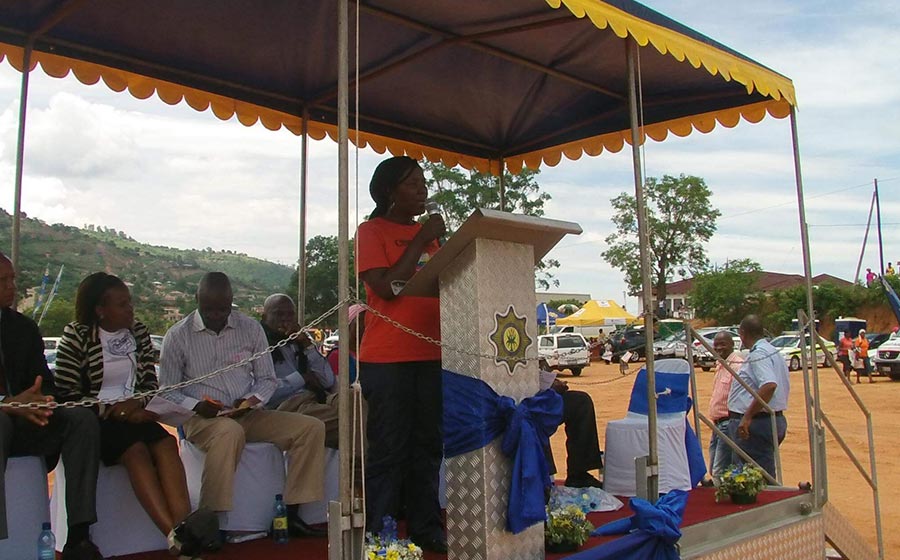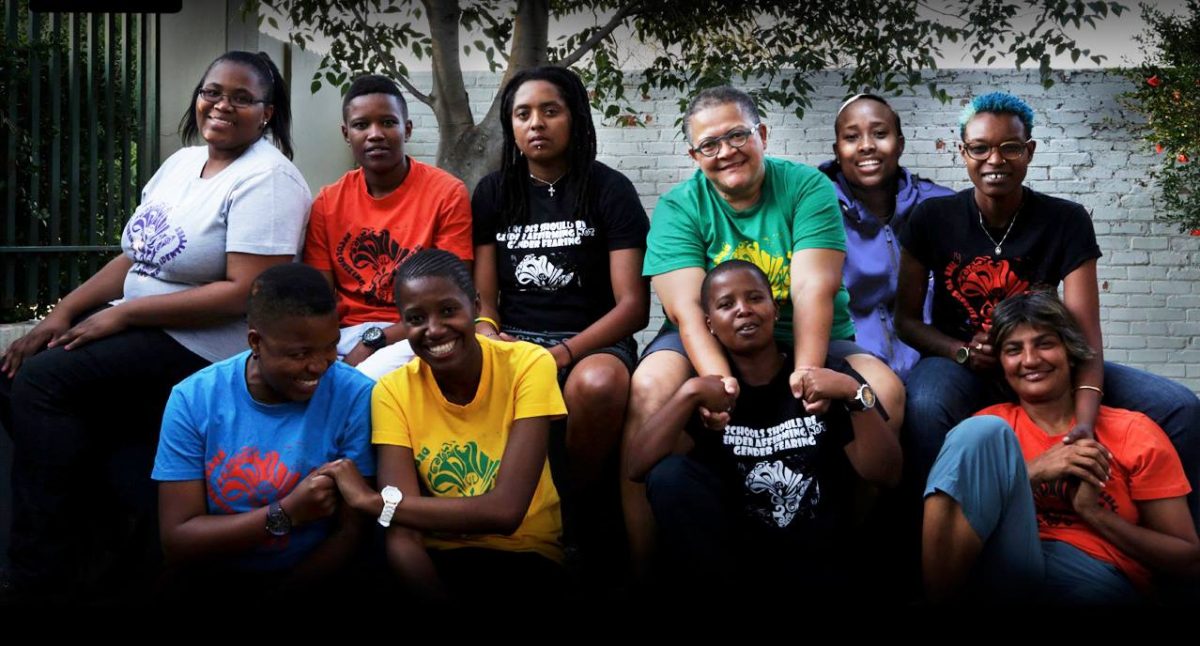Location: South Africa
-30.559482, 22.937506
Kopanang: Empowering Women for Success
Dance for All
See Thru Media
Kwa Thema Gay and Lesbian Organisation
S.H.E, Social, Health and Empowerment Feminist Collective of Transgender Women of Africa
Based in East London, Social, Health and Empowerment Feminist Collective of Transgender Women of Africa (S.H.E.) was formed in 2010 to address the gender imbalance in the African trans movement, build the leadership of trans women, and work for greater inclusion of trans women and their issues in African women’s and feminist movements at the local, national and regional levels.
Based in East London, Social, Health and Empowerment Feminist Collective of Transgender Women of Africa (S.H.E.) was formed in 2010 to address the gender imbalance in the African trans movement, build the leadership of trans women, and work for greater inclusion of trans women and their issues in African women’s and feminist movements at the local, national and regional levels. At the local level, S.H.E. works with trans women in peri-urban informal settlements and township communities, predominantly in the Eastern Cape Province, where they run support groups and ‘co-powerment’ programs. At the national level, they collaborate with women’s movements to raise issues of violence against trans women, and with trans and intersex organizations to advance campaigns for access to health care. At the continental level, they build the capacity of trans and women’s rights organizations. They held the first African Transformative Feminist Leadership Institute, which brought together 14 transgender women activists from 8 countries working to advance a feminist agenda for trans women on the African continent, starting with the release of the “African Transfeminist Charter.” Check out our 2018 International Trans Day of Visibility video featuring an interview with S.H.E. Founder Leigh Ann Van Der Werwe:
Limpopo LGBTI Proudly Out
Formed in 2011, Limpopo LGBTI Proudly Out (LLPO) was the first formal LGBTI organization to exist in Limpopo, South Africa’s poorest province.
Formed in 2011, Limpopo LGBTI Proudly Out (LLPO) was the first formal LGBTI organization to exist in Limpopo, South Africa’s poorest province. It organized the first LGBTI Pride event in the province in 2012. LLPO’s work centers on three strategies: empowering LGBTI communities in the province to exercise their rights, building public support for LGBTI issues, and supporting the inclusion of LGBTI rights in government services and civil society programs. Heteronormativity prevails in Limpopo and is enforced by government officials, traditional authorities and communities at large. LGBTI communities experience high levels of hatred and violence, including “corrective rape” and murder.
Iranti-Org
Iranti-Org formed in 2012 to help local and regional lesbian, trans, intersex and gender non-conforming (LTIGNC) movements in South Africa and across the continent use media as a platform for mobilization and shifting public dialogue.
Iranti-Org formed in 2012 to help local and regional lesbian, trans, intersex and gender non-conforming (LTIGNC) movements in South Africa and across the continent use media as a platform for mobilization and shifting public dialogue. They support organizations to document human rights violations and produce evidence-based materials, and they also support cultural production to change attitudes about sexual orientation, gender identity and gender expression. Iranti-Org does this work to address the poor media capacity of LTIGNC groups, most of which don’t have media and documentation equipment or training in how to work with media; digital security is also a pressing need. In an exciting development, they recently launched an LBTIGNC Media Makers Network that supports activists across Southern Africa to produce their own media. In South Africa, Iranti-Org’s own media production and reporting plays a key role in strengthening the national LGBTQ movement. In collaboration with LGBTQ community groups across the country, they investigate hate crimes, use their reporting to hold the state accountable for addressing violence, and document LGBTQ mobilization.
Behind the Lens: Grantee Partners at Work
Astraea and our grantee partners recognize the power of art to create social change. Through our Global Arts Fund and threaded throughout our work, we showcase and connect art by LGBTQI people and organizations that use art as a tool for social transformation.
Astraea and our grantee partners recognize the power of art to create social change. Through our Global Arts Fund and threaded throughout our work, we showcase and connect art by LGBTQI people and organizations that use art as a tool for social transformation. Spanning multiple genres, our grantee partners’ exemplary work has been acknowledged by Sundance, the American Film Institute and the Museum of Modern Art.
Film holds a unique role in social change. As lesbian experimental filmmaker Barbara Hammer writes, “I chose film and video as a medium to make the invisible, visible… I want people to leave the theater with fresh perceptions, emboldened to take active and political stances for social change in a global environment.”
Watch From Home
The New Black (Dir. Yoruba Richen)
 Stream The New Black on Netflix.
Stream The New Black on Netflix.
Directed, produced and written by Global Arts Fund panelist Yoruba Richen, this documentary offers a comprehensive look at “how the African-American community is grappling with the gay rights issue in light of the recent gay marriage movement and the fight over civil rights.” The New Black utilizes a decade’s worth of newsreel footage and features interviews with prominent Black voices from both sides of the marriage equality debate. Read more about this gripping documentary.
Mujeres al Borde (Colombia)
 Stream documentaries by Mujeres al Borde on Vimeo.
Stream documentaries by Mujeres al Borde on Vimeo.
Founded in 2001, grantee partner Mujeres al Borde (Women in the Margins) uses cultural production and community building to promote the rights of women and LGBT communities. Mujeres al Borde coordinates the Audiovisual Regional School, Al Borde. Open to all women and LGBT people, Al Borde produces short films about LGBT activists in South America. These have been screened and awarded at 30 film festivals across the globe, including the Queer Women of Color Festival and the Venezuelan Film Festival of Diversity. Learn more about Mujeres al Borde’s mission to raise visibility through film.
Iranti-Org (South Africa)
 Stream Iranti’s short documentaries on YouTube.
Stream Iranti’s short documentaries on YouTube.
Grantee partner Iranti-Org formed in 2012 to help local and regional lesbian, trans, intersex and gender non-conforming (LTIGNC) movements in South Africa and across the continent use media as a platform for mobilization and shifting public dialogue. Iranti supports organizations to document human rights violations and produce evidence-based materials, including short YouTube documentaries about violence against LGBT people in South Africa. Read about Iranti-Org’
Remembering Leslie Feinberg
This Trans* Day of Remembrance, Astraea mourns those our community has lost, and celebrates the legacy of one we have loved; Leslie Feinberg.
Photo taken by Kelebogile Ntladi on behalf of Iranti-Org
Each year on November 20th, we come together with our communities in the U.S. and around the globe for Transgender Day of Remembrance to celebrate the courage and resilience of those who have been murdered because of transphobia and hatred.
Today many of our grantee partners have organized commemorations and celebration events. Transgender and Intersex Africa (TIA) and Iranti-Org are two in South Africa who hosted a day of affirmation and celebration and renewed a mandate to ensure the government commits to increased services and policy changes for trans persons. 200 people took time to be part of the day, and one of the activists commemorated was Leslie Feinberg who died on November 15th.
Astraea joins Iranti-Org and TIA in remembering the legacy of a groundbreaking activist for trans* liberation and social justice. A fierce outspoken advocate for trans* rights, Leslie drew sharp attention to anti-racist white, working-class, secular Jewish, transgender, lesbian, female, revolutionary communist issues. Zhe will be remembered for hir novels Stone Butch Blues and Transgender Liberation, editing the communist Workers Worldnewspaper, mobilizing against the KKK in Atlanta and defending Buffalo, NY from anti-choicers. Remember me as a revolutionary communist. were hir last words, as reported in an obituary by Feinbergs partner of 22 years, activist and poet Minnie Bruce Pratt.

The 1993 Lesbian Writer’s Fund Awards Gala, Pictured left to right: Cheryl Clarke, Leslie Feinberg, Minnie Bruce Pratt, event emcee Karen Williams, and Cheryl Neal Reed.
Today, on Trans* Day of Remembrance, we stand in solidarity with trans* folks around the world and recommit ourselves to supporting struggles for gender, racial and economic justice for all. We also recognize the impact Leslie had on our lives and the lives of many of our grantee partners. To honor hir wide-reaching legacy we share a few stories from grantee partners and friends who recount the life changing impact zhe had on us as activists, as lovers, as friends and comrades.
Mauro Cabral, Co-Director, Global Action for Trans* Equality, Argentina
“I met Leslie Feinberg in the mid nineties, when their name represented a poetic and political discourse among lesbians and trans men. Apart from being a benchmark literary figure, Feinberg’s work engaged with themes of solidarity, love, friendship, and hope. Leslie Feinberg wasn’t just a popular North American writer to us, but someone who instigated a constellation of emotions that impacted our ways of resisting, speaking, feeling, and writing about our identities. Leslie was one of the key authors we would incorporate into our work and was someone who ignited passion in us about our lives. With Leslie’s death, I feel a piece of the world has died, but of course they have left us with the legacy of a shared struggle to change the world.”
Liesl Theron – founder of Gender DynamiX, South Africa
“It is obviously impossible for me to speak for South Africans, or for any people in the global South, I can really just speak for myself. Both early publications of Leslie Feinberg’s Stone Butch Blues and Trans Liberation – Beyond Pink or Blue were potentially the two most read books in countries where there were not many/any other trans/lesbian/queer publications available. They both became most influential to many, many trans* and lesbian people. They were read in shared community libraries, queer book clubs and disseminated far beyond activist circles because they covered so many intersecting struggles. They became important to many activists and struggle lives, ideologies and formations. I am yet to meet or know of a trans activist who is so widely read….Trans Liberation, which is the more political of the two, is written in an easy-to-read English. People who are not academic scholars can easily access it. A great person, with sterling analytical mind left us.”
To find Transgender Day of Remembrance events in your community, visit the International Transgender Day of Remembrance website.
To learn more about International Day of Action Against Trans Depathologization, visit Stop Trans Pathologization.





